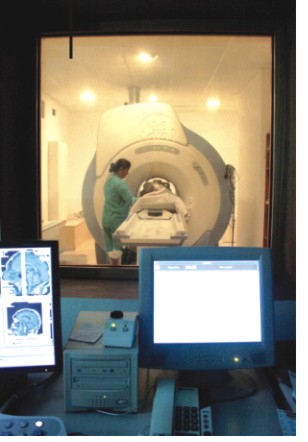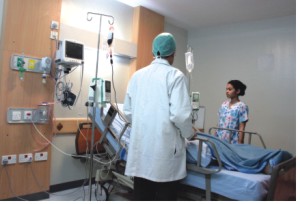|
Health
Matching the Lure for Treatment Abroad
Srabonti Narmeen Ali
 It's no secret that there is a strong sense of distrust towards the medical system in Bangladesh, thanks to the frequent cases of malpractice that people hear about either through the media or the grapevine. That and the often perfunctory attitude of doctors toward their patients has added to the general public's lack of confidence in the health care system. The inception of corporate hospitals, with their foreign five-star-hospital-like ambiance has attracted a lot of attention, but has not quite dispelled the general skepticism regarding health care in this country, no matter how glossy the presentation. Those who can afford to -- a stark minority of the population -- go abroad for treatment, while the less fortunate are forced to be content with the often inefficient health care available in the country. It is for this reason that affiliations with foreign hospitals may help to change the scenario. It's no secret that there is a strong sense of distrust towards the medical system in Bangladesh, thanks to the frequent cases of malpractice that people hear about either through the media or the grapevine. That and the often perfunctory attitude of doctors toward their patients has added to the general public's lack of confidence in the health care system. The inception of corporate hospitals, with their foreign five-star-hospital-like ambiance has attracted a lot of attention, but has not quite dispelled the general skepticism regarding health care in this country, no matter how glossy the presentation. Those who can afford to -- a stark minority of the population -- go abroad for treatment, while the less fortunate are forced to be content with the often inefficient health care available in the country. It is for this reason that affiliations with foreign hospitals may help to change the scenario.
At Square Hospital, a team consisting of Dr. Md. Amer Wahed, Assistant Medical Director and Consultant Pathologist and Hematopathologist, and his colleague Maruf Ahmed, Marketing and Business Development, has decided to take health care in Bangladesh to new heights by creating partnerships with a number of different hospitals abroad, such as Methodist le Bonheur Health Care, Memphis Tennessee, USA, Christian Medical College Hospital (CMCH), Vellore, India, SingHealth (a conglomerate of seven different health care facilities in Singapore) and Bangkok Hospital Medical Centre, Bangkok, Thailand, in order to provide their patients not only with better health care in terms of up-to-date technology and facilities, but also the option of getting a second opinion from any one of these foreign affiliations without leaving Bangladesh.
Patients who go abroad for check-ups can follow up at Square by having their blood test results sent over by DHL and images such as X-rays and scans sent via internet to any of these health care facilities. This makes it possible for the patient in question to get an unbiased and experienced second opinion.
“It is the patient's right to want a second opinion,” says Dr. Amer, who has been at Square since 2005 (one year before it opened). “So we have tried to introduce a system where patients get the first diagnosis here and then, if they wish, they can get a second opinion from one of our affiliated partners. Our job is to gain the trust of the people and maintain that trust by not giving the patients false information. If there is something that I cannot do as a doctor, or I think that a doctor in another institution can do better, it is my responsibility to make that clear to the patient. As a physician my loyalty is to the patient.
“Every hospital in Bangladesh is different, but at the end of the day, they all want the same thing -- to minimise the misgivings that the public have towards the health care system in Bangladesh and to ensure that more and more patients stay in Bangladesh for medical treatment. In addition, Square Hospital is setting up telemedicine facilities for patients in Bangladesh who wish to consult physicians or specialists in any of our partner hospitals. This is one step above getting the test diagnoses from them.”
It is important for patients to have the option of consulting with doctors abroad because, unfortunately, the general public's opinion of the Bangladeshi health care system is not always favourable. Due to a series of malpractice cases that have been made public by the media, Bangalis have very little faith in the country's health care system -- an issue that the doctors and physicians at Square are not only aware of, but trying very hard to overcome.
 “We are conscious of the various forms of malpractice that occur in Bangladesh,” says Dr. Amer, “but the truth of the matter is that no hospital, no matter where in the world you go, will be 100% accurate -- not even in the United States. What we are trying to do at Square is at least make it 90%. And we have been successful. It was stated in an independent survey that about 90% of Square Hospital patients are happy with the medical staff.” “We are conscious of the various forms of malpractice that occur in Bangladesh,” says Dr. Amer, “but the truth of the matter is that no hospital, no matter where in the world you go, will be 100% accurate -- not even in the United States. What we are trying to do at Square is at least make it 90%. And we have been successful. It was stated in an independent survey that about 90% of Square Hospital patients are happy with the medical staff.”
The proof of Square Hospital's success also lies in the fact that 50% of outpatient samples come from outside the hospital and that the British High Commission Clinic sends all their pathology samples to Square. In addition, the affiliated hospitals have sent inspection teams from abroad to check every different aspect of the hospital, starting from hygiene and sanitation issues to facilities and medical staff.
In order to guarantee that the medical staff is able to cater to their patients, Square Hospital and its partners have also set up different training programmes, workshops and educational seminars for the staff so that not only can they share their experiences with the medical staff from other countries, but also get exposure.
“To date,” says Maruf Ahmed, “we have sent about 90 nurses to Bangkok and 100 nurses to India. The standard course for nurses is a minimum of one month and a maximum of two months, while the minimum for doctors is two weeks. However, it all depends on the specified field in which these doctors and nurses are training. The most important thing is that there is cooperation between all these hospitals and also the exchanging of information about technology and equipment.”
However, there is another aspect of health care that needs serious improvement in Bangladesh -- that of doctor-patient relationships. Most patients feel that doctors often leave them in the dark by not explaining things the way they should. As someone who has not only studied medicine abroad but also worked in Houston Medical Centre, in the USA, Dr. Amer understands that whether or not the patient at hand understands the medical terminology, it is still important to clearly explain the situation to the patient in order for them to feel more involved and informed. However, Bangladesh's health care system is a far cry from this school of thought.
“I would not say that those who are lucky enough to study abroad are better doctors,” says Dr. Amer. “In fact, there are many doctors who have studied and worked here and are very good doctors. Square has a combination of both. It is true that in our current system, doctors do not communicate extensively with the patients. Unfortunately, we are used to giving instructions and not fully explaining the process to the patient. And that is something that we have to change. Although it is important for the patient to understand fully what is going on, sometimes doctors find it easier to not go into a detailed explanation. But this attitude is what causes patients to distrust us. It is important for the physician to treat the patient with respect, and only then will patients start to trust the system.”
Copyright
(R) thedailystar.net 2007
|
